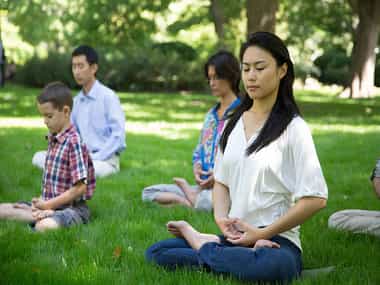Your health is an investment. What you do in your 20s and 30s impacts how you will look and feel in your 50s and 60s. In fact, research shows that the earlier you start to care, the better the results will be. Keeping this in mind, here are three things you can start doing today for a healthier, longer life.
[caption id=“attachment_7610511” align=“alignleft” width=“380”] Representational image. Wikimedia Commons[/caption] Mindful eating US scientists Linda Partridge and Luigi Fontana recently conducted research on lab rats, young and old, to determine if eating less could prolong life. The study found that a decrease in the amount of food during adulthood leads to less age-associated stiffness in the heart muscle (myocardial stiffness) and improper functioning of the nervous system (autonomic dysfunction). Eating less also reduced inflammation, increased resistance to stress, improved immune function, increased insulin sensitivity, and improved stem cell function in mice as well as humans, according to the study. Another study showed that calorie restriction may help reduce excess body weight which is associated with a shorter lifespan. We all know visceral fat increases risk for insulin resistance, type 2 diabetes, cardiovascular disease, stroke and death. Cutting down on food as we grow older leads to an increase in the formation of mitochondria in fatty tissue, which help in breaking down fat, thus increasing longevity (mitochondria are presents in the cells of our body, they break down glucose for energy). Of course, this does not mean that you go hungry. But if you have a sedentary way of life, think of ways to eat healthier. For example, try to remove sugar from your diet, which may satisfy your cravings in the short term but they will make you hungry as soon as your blood sugar crashes. Also read:
Five quick and easy-to-make smoothies for weight-loss Exercise regularly It should come as no surprise that staying physically active can keep you healthy and add years to your life. But you may be surprised by how much of a difference it makes. A study published in The Lancet suggested that exercising 15 minutes a day or 90 minutes a week can add three years to your life. The study found every additional 15 minutes of daily exercise, beyond the minimum of 15 minutes per day, further reduces the risk of premature death by four percent. Moderate-to-vigorous physical activity, like brisk walking or cycling, for 150 minutes a week reduces the risk of premature death in adults at or above 60 years of age by 22 percent. Studies also have the answer to which exercises are the best, vigorous exercises like jogging, aerobic dance or cycling uphill have been found to be more efficient at reducing the risk of early death in people when compared with moderate exercises. Sleep well Sleep is one of the most important factors for maintaining a healthy life (so if you’re thinking about pulling all-nighters before the client presentation next week, try to reimagine your schedule in a way that allows you to get shut-eye for at least seven hours daily). Studies have shown that people with disturbed sleep, especially disturbed “slow-wave sleep” or deep sleep, are prone to have hormonal irregularities and metabolic syndromes like type 2 diabetes and obesity. Additionally, older people with a stable slow-wave sleep also tend to have better liver function, better appetite and good hormonal control. Regularising sleep patterns has been shown to help balance hormone release and, together with a healthier diet, contribute to lower cardiovascular risk (heart diseases) and increased longevity. Lack of sleep also been associated with inflammation, increased risk of diabetes, heart disease, and obesity, which are thought to shorten lifespan. On the other hand, excessive sleeping can result in a greater risk of obesity, an undiagnosed health condition and even death. So, a sum of the right amount of food for our age, regular exercise and sound sleep for at least seven hours daily (on most days) in your 20s and 30s can bring you good health and joy for decades to come. Health articles in Firstpost are written by myUpchar.com, India’s first and biggest resource for verified medical information. At myUpchar, researchers and journalists work with doctors to bring you information on all things health. For more information, please read our article on
Sleep Disorders: Symptoms, Causes, Treatment.


)

)
)
)
)
)
)
)
)



